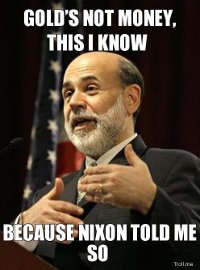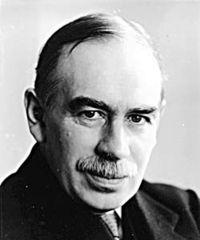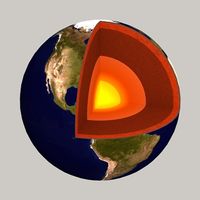Think of this as Volume 16, Number 3 of A-Clue.com, the online newsletter I've written since 1997. Enjoy.

Economically, what happened in the early years of the Nixon Era was that two key economic interests divided.
Manufacturing, mainly based in the Midwest, took political power throughout the Kennedy and Johnson years. Technology, companies like Intel and Hewlett-Packard, both based in California, gravitated toward the Republicans. And it was this divide within the business community that ultimately proved crucial, as the New Deal moat was destroyed in the 1972 Nixon landslide, validating the creation of “fiat currency” to solve tech's natural tendency toward deflation.
This sort of thing had happened before. Each one of our political crises began when one industry seized power and, in time, other industries objected. It was the final triumph of the new economic order, the validation of a new set of myths and values in succeeding elections, that eventually resulted in each New Thesis, each new Age of American politics.
From the Age of Jackson to that of Lincoln. From the Age of Lincoln to that of Teddy Roosevelt. From the Progressive Era to the New Deal. From the New Deal to the Nixon Era.
From the Nixon Era to the Obama Era. It's not the leaders who create their times. They just ride the waves and take the credit. It's economic change that drives the train, under the surface.

What has been happening in the SOPA-PIPA battle is similar. The two pillars of the Nixon economy, content and technology, have divided. Content, which rose to power under FDR, and moved toward the GOP with Nixon, is being overrun by the forces of technology, who are in turn molding the Democratic Party in their own image.
It's not a uniform move. It never is. There were Republican car manufacturers in the 1960s like George Romney, and there were Democratic utility magnates in the 1920s. (Al Smith called them his base.) But industry – economic interests – have always been the tectonic plates whose shifts create our political earthquakes. There are many Republicans in Silicon Valley. But it's this balance of forces that drives both our economy and, in the end, our politics.

What I've found in my study of American history over the last decade is that there are multiple cycles, mostly moving in concert, deep underground within the economy. Think of them as currents, like the Gulf Stream, moving deep underneath us.
The technology cycle is one generation old, and thus is at the height of its power, able to act almost wholly below the political surface. The content cycle is two generations old, and thus finding for the first time that it's not getting its way, as technology separates from it. The oil cycle is three generations old, and having seized political power over the last decade it is just now being pushed back by new economic forces formed in reaction to that power seizure.
Here it is more simply. Energy harvesting is rising to replace fossil fuels. That's an economic change 100 years in the making. Content is getting political push-back for the first time in two generations, and technology is now entering its political golden age.

Andrew Sullivan wrote recently that President Obama is playing “a long game.” This is the game he's playing. Re-alignment isn't just a new balance between government and the people, but a new balance among industrial sectors and economic models.
This is a good thing. The aim of our politics is greater prosperity, greater freedom, for all. It's political tectonics that makes it possible, and economic interests are its currents.










